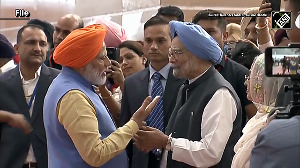In a significant leap in the transportation of natural gas from central Asia into the Indian sub-continent, the Asian Development Bank has opened bids for constructing the Turkmenistan-Afghanistan-Pakistan natural gas pipeline, saying that it could extend it to India in the future.
India, the region's biggest energy market, is a key target for the countries of the Gulf and Central Asian regions that have abundant natural gas.
Iran and Pakistan have been trying to push India to accept a proposal for constructing gas pipeline from Iran through Pakistan into India.
According to the Asian Development Bank, the Turkmenistan pipeline through Afghanistan and now till Pakistan would be "designed, constructed, owned, operated, and maintained by a consortium led by an internationally reputed oil and gas company, or an association of companies."
The ADB is assisting the governments of Afghanistan, Pakistan and Turkmenistan in developing this project that could not take off in early 1990s because of the instability in Afghanistan.
An advertisement placed in The Economist (May 3-9, 2003) by the ADB on behalf of the governments of Turkmenistan, Afghanistan and Pakistan invited interested parties to submit their expressions of interest for participation in the project.
According to a central government official, India was invited for the project officially in April earlier this year. A letter from Turkmenistan, Afghanistan and Pakistan invited India to participate in the 1,600 km pipeline project, he said.
The $2.5 billion gas pipeline project is expected to take almost 30 billion cubic meters of natural gas every year from Dauletabad fields in southeast Turkmenistan to Afghanistan and Pakistan.
From the oil rich Dauletabad gas field in Turkmenistan, the pipeline will run into Herat in Afghanistan to Kandahar before entering Pakistan through Multan.
According to proposals, the pipeline could be extended to Gwadar Port, which Pakistan is presently developing with Chinese assistance, where a gas liquefaction plant would be built.
Another branch of the line could be extended to India, if New Delhi is ready for it.
While the other three parties want India to participate because of its huge market potential, India has expressed its reservations citing security concerns.
According to some estimates the pipeline with its capacity of 20 billion cubic metres would only be profitable if it supplies gas supplies to India too.
Already, another high profile pipeline project from southern Iran to India through Pakistan is stuck because of security reasons.
Numerous efforts by Iran are yet to succeed, even as some quarters within the India advocate the pipeline under sea, avoiding Pakistan.
India fears Pakistan may interrupt or sabotage the pipeline to its advantage during times of crises, although the Pakistan government has given assurances against such an event.
There are many, some even within the government, who feel the pipelines could bring about peace and stability in the region.
"When other countries are involved Pakistan may not wish to soil its international image by harming the pipeline," an Indian official told rediff.com.
An ADB press release in April said that the pipeline has the "significant potential to improve stability and raise living standards in south and central Asia."
Even as it opens its bids, the main challenge for the project and its beneficiaries is to find credible international agencies willing to take risks in an unstable region where terrorism and warring neighbours figures high among several challenges.
According to the ADB advertisement, an independent pipeline company will be established for this project, "the shares of which will be held by the selected international oil and gas company or a consortium, the three governments, development finance institutions, commercial finance institutions, and other interested parties."
ADB will "assist interested consortium members in mobilizing finances, finalizing agreements and bringing about the financial closure for the project."






 © 2024 Rediff.com -
© 2024 Rediff.com -